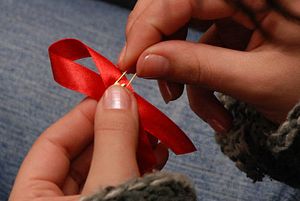Woo Kim lost several teeth a few years ago and wanted a dental implant but for quite some time he did not have the money for the operation. Earlier this year, the 40-something grocer, who lives in Seoul, South Korea, had finally saved up enough funds.
“I was looking forward to getting a full set of teeth, but I was worried about going to the dentist, because I am living with HIV,” said Kim, who prefers not to use his real name. “I did some research and found a clinic I was told would provide treatment regardless of my status.”
Reassured, that he had nothing to fear, Kim checked his HIV status as positive on the pre-test examination card. However, his optimism and confidence were crushed when the hospital refused to provide him with services.
“People living with HIV have the same right to receive necessary health care” said Kim. “This kind of routine refusal of treatment cannot be justified.”
The Korean Network of People Living with HIV/AIDS (KNP+) is supporting Kim in his efforts to seek redress and has made a formal complaint to the hospital.
“This is just one of several cases of people living with HIV who have been turned away from hospitals,” said Son Mun Soo, president of KNP+. “At the moment there is no legal or institutional policy to support those who are denied health care. A comprehensive anti-discrimination law must be enacted in the Republic of Korea to protect the rights of people living with HIV.”
A new survey conducted by KNP+ finds that people living with HIV reported that they routinely experienced discrimination in healthcare settings. The Korean People Living with HIV Stigma Index, which is the first peer-led survey in the country to detect and measure how HIV-positive people experience stigma and discrimination, was released on June 22. It was supported by the Global Network of People Living with HIV (GNP+), the International Community of Women Living with HIV/AIDS (ICW), and UNAIDS.
NC Cho works in the fashion industry in Seoul and three years ago, after experiencing high fever and muscle aches, he went for a check-up. Several clinics couldn’t find anything wrong but finally after his third visit, the doctor told him he had tested positive for HIV. Cho was furious as he had not asked for the test and was provided with little helpful information.
“The doctor basically told me you may be able to stay healthy, but you could also get very sick, lose a lot of weight and then die,” said Cho. “He gave me some medicine for a cold and made it pretty clear that I should not come back.”
While there is no cure for HIV, many studies have found that anti-retroviral treatment can ensure an HIV-positive person lives a healthy life. UNAIDS and the World Health Organization strongly recommend that HIV testing only be undertaken with a person’s informed consent. However, the Stigma Index survey found that 62 percent of people questioned reported that they were tested without their knowledge. This is high compared to other countries in Asia. In Vietnam, 13 percent of people living with HIV reported similar experiences and in Nepal the figure was 9 percent. In addition, 17 percent of people surveyed in South Korea said their status was disclosed by medical staff to others without their consent.
“Healthcare settings should be stigma-free environments, which ensure people living with HIV not only stay healthy, but their loved ones and community are also protected from HIV,” said Steve Kraus, director of UNAIDS Regional Support Team for Asia and the Pacific. “It is imperative that we have protective laws and empowered communities.”
The survey found that while most respondents disclosed their HIV status to their families out of a sense of obligation, almost 40 percent reported isolating themselves from loved ones because of their HIV status. Self-stigma was also high among respondents, with 75 percent feeling self-blame and more than a third experiencing suicidal thoughts.
According to the Korea Centers for Disease Control and Prevention, there were 13,581 cumulative reported cases of HIV infections in South Korea in 2016, a 77 percent increase since 2010. The epidemic is heavily concentrated among gay men and other men who have sex with men in urban settings.
“I think there is perhaps more discrimination from the gay community toward people living with HIV than from heterosexuals,” said Cho. “There is this notion that if you have HIV you are promiscuous and are not living by the required moral standards.”
KNP+ is not only calling for an anti-discrimination law but training for healthcare providers that emphasizes patients’ rights, as well as strong measures and penalties to prevent patient privacy violations.
Sakuya Oka is the Regional Advocacy and Communications Adviser for UNAIDS Regional Support Team for Asia and the Pacific. She is based in Bangkok, Thailand.
































